Key takeaways:
- Community housing development fosters stability, belonging, and empowerment among residents, creating vital support networks.
- Stable housing significantly impacts individual well-being, economic stability, and community involvement.
- Housing instability leads to anxiety, financial strain, and social disconnection, affecting overall quality of life.
- Building a support network and accessing community resources can greatly alleviate the challenges of housing instability.
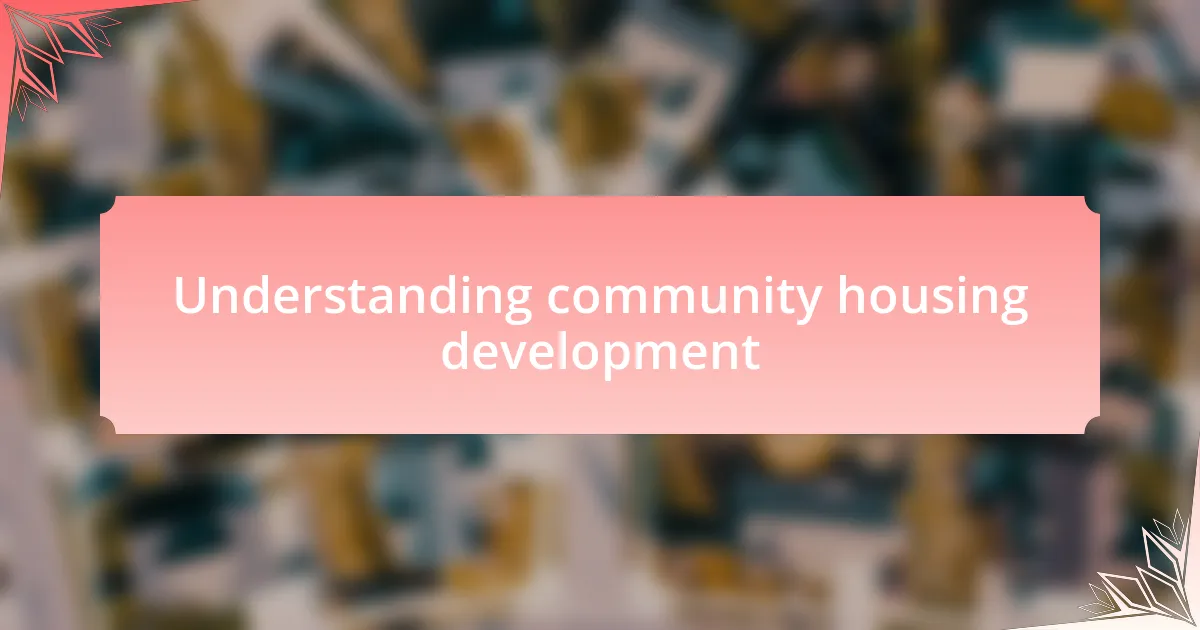
Understanding community housing development
Community housing development plays a crucial role in providing secure and affordable housing options for individuals and families facing instability. I remember when I first learned about its impact while volunteering at a local shelter. Hearing stories from residents about how these developments transformed their lives was eye-opening; it made me realize just how vital stable housing is for fostering community ties and personal well-being.
What struck me most was the sense of belonging that often blossomed in these neighborhoods. Have you ever moved to a new place where the connections felt instantaneous? That’s the kind of environment that community housing aims to create—one where support networks flourish and residents feel empowered to shape their surroundings. Through my experiences, I witnessed how communal spaces fostered friendships and support among neighbors, nurturing a sense of home.
Moreover, community housing isn’t just about the buildings themselves; it encompasses a holistic approach that addresses social, economic, and environmental aspects. When I attended workshops on sustainable practices in community housing, I was inspired by the collective vision people shared. It made me wonder: could creating a vibrant, inclusive community be the key to overcoming more than just housing instability? It certainly seemed that way as I listened to passionate advocates share their insights and experiences.
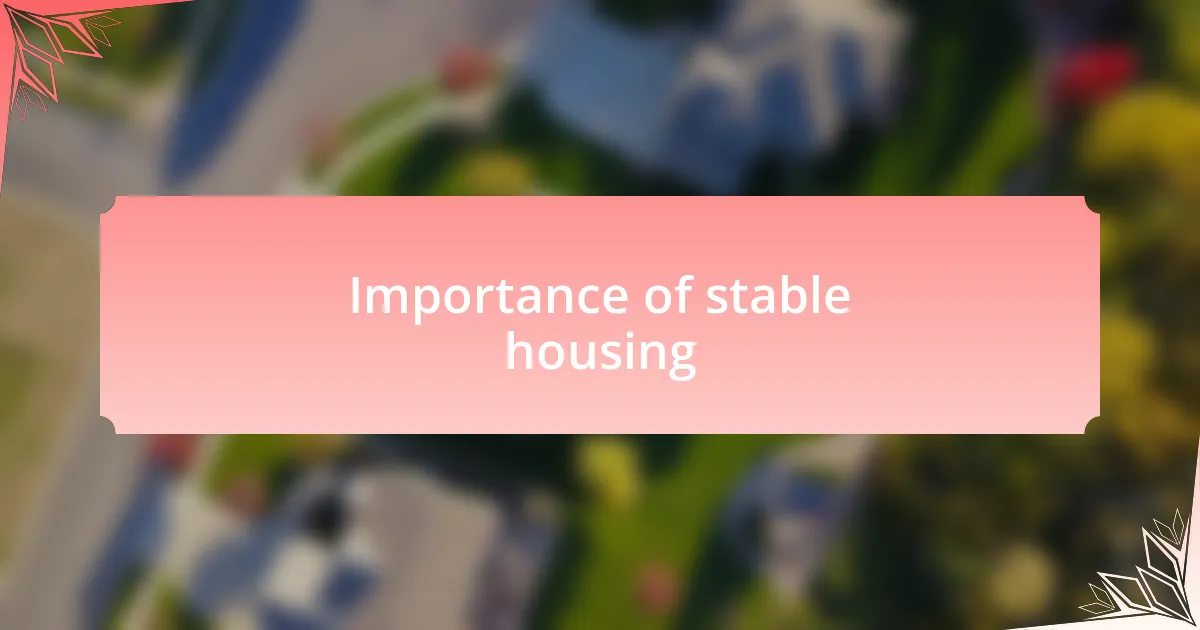
Importance of stable housing
Stable housing is more than just having a roof over your head; it’s the foundation of well-being. I remember a friend of mine who moved from a temporary housing situation to a stable apartment. The difference in her demeanor was remarkable. She became much more engaged in her job and even started volunteering, something she just didn’t have the energy to do before. When you have a reliable place to call home, it allows you to focus on growth and community involvement, doesn’t it?
I’ve seen how stable housing can have ripple effects in a person’s life. When my neighbor finally secured a long-term lease after months of uncertainty, I noticed her starting a gardening project in the backyard. She told me that for the first time, she felt she could invest in her space. This kind of investment isn’t just physical; it’s emotional. When individuals feel anchored, they often give back, contributing their talents and time to weave a tighter fabric in the neighborhood.
On a broader scale, stable housing fosters economic stability, not just for individuals but for communities as a whole. In a workshop I attended, discussions around housing stability highlighted that people with secure homes are more likely to find steady employment and invest in education. Isn’t it fascinating how something as fundamental as housing can influence larger socioeconomic patterns? It truly underscores how important it is for us to advocate for community housing development initiatives.
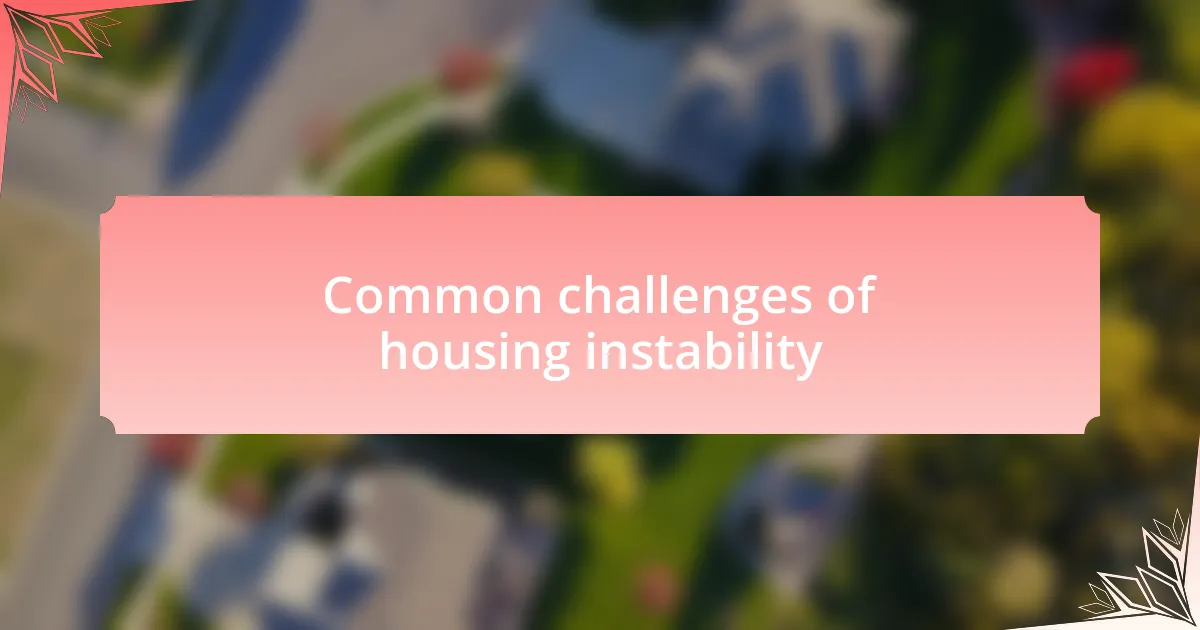
Common challenges of housing instability
Housing instability presents a myriad of challenges that can weigh heavily on individuals and families. I remember the anxiety a colleague experienced when she faced eviction. The uncertainty of where she would go next became a cloud over her daily life. It’s hard to focus on work, relationships, or even self-care when the roof over your head feels precarious.
Financial strain is another common hurdle that comes with housing instability. I’ve often witnessed friends juggling multiple jobs just to keep up with rent payments, leaving little room for anything else. It’s heartbreaking to see talented individuals who, instead of pursuing their dreams, spend their energy on survival. How can anyone thrive when basic needs, like stable housing, remain unmet?
Additionally, housing instability often leads to social disconnection. A neighbor of mine was forced to move frequently, making it difficult to build lasting friendships within our community. She shared that the isolation made her feel like a ghost in her own life, as each new place stripped away her sense of belonging. Isn’t it sad how the place we call home can deeply influence our social connections and mental well-being?
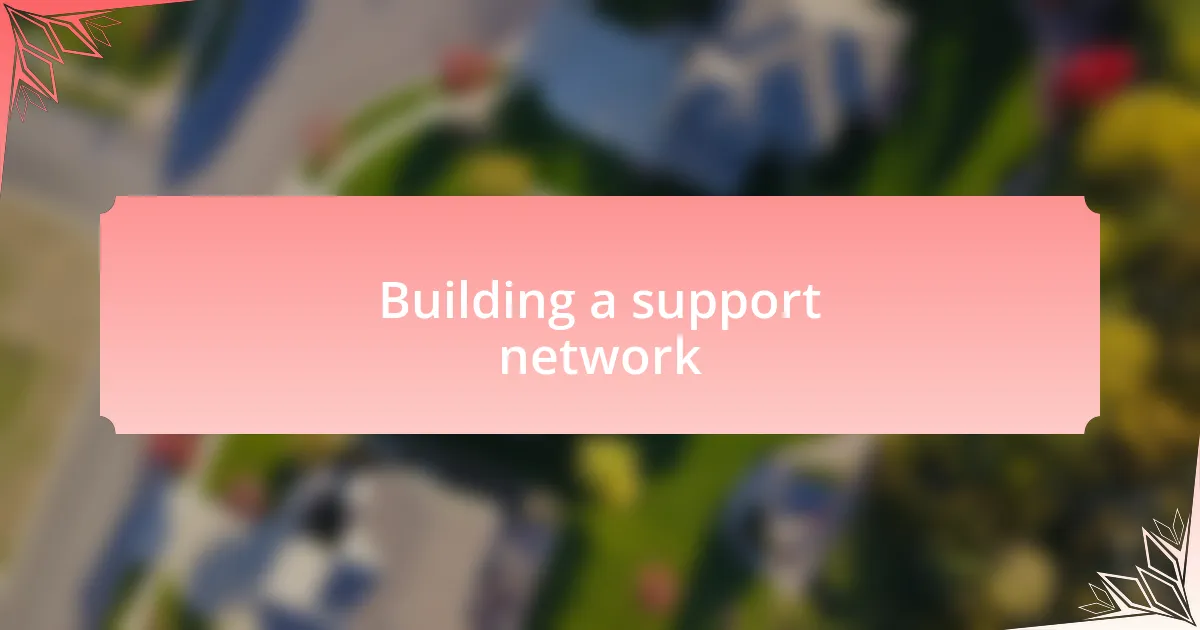
Building a support network
When facing housing instability, I found that building a support network was invaluable. I reached out to friends and family, sharing my situation honestly. Just having someone to talk to about my struggles was a balm for my anxiety.
I also sought out local groups focused on community support. Joining a networking group offered me a chance to meet others who faced similar challenges. We shared resources, tips, and emotional support, which helped me feel less alone. Isn’t it incredible how connecting with others can transform our experience of hardship into a shared journey of resilience?
Sometimes, the most unexpected connections can be the most meaningful. I remember meeting a fellow tenant at a housing workshop, and we quickly bonded over our experiences. This led to weekly coffee catch-ups where we exchanged advice and built camaraderie. Wouldn’t it be wonderful if everyone could find someone to share their burdens with during tough times?
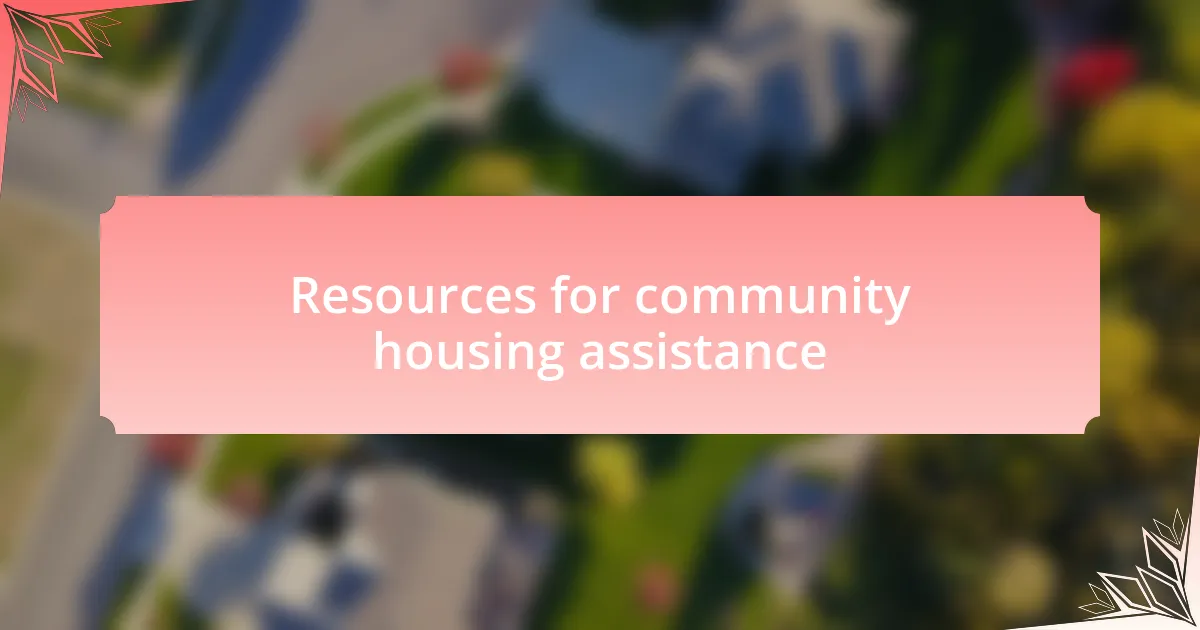
Resources for community housing assistance
Accessing the right resources for community housing assistance can significantly alleviate the burden of housing instability. I remember browsing local government websites and discovering programs aimed at providing temporary financial aid for rent. These resources offered me a lifeline when my situation felt particularly dire, reminding me that help is often closer than we think.
Nonprofit organizations can also be an incredible source of assistance. When I reached out to a local nonprofit focused on housing issues, they not only guided me through available options but also connected me with legal aid services. The reassurance of having someone knowledgeable by my side made a daunting process feel much more manageable. Have you ever felt overwhelmed by bureaucracy? I certainly have, and finding advocates who can navigate the system for you is a game changer.
Finally, don’t underestimate the power of community resources like food banks or local outreach programs. These can provide immediate relief while you seek more stable housing solutions. I vividly recall a community fair where I learned about a housing advocacy group that organized workshops. Attending one not only gave me practical tools but also introduced me to people who genuinely understood my struggles. Isn’t it amazing how a single event can open doors to so much support?

Personal reflections on my journey
Navigating through my housing challenges often felt like sailing in unpredictable waters. I remember the nights when anxiety would creep in as I lay awake, wondering where I would end up next. Reflecting on those moments, I realized that it was not just about finding a roof over my head; it was about reclaiming my sense of stability and belonging.
Along the way, certain people and experiences became bright spots in my journey. I can still recall a conversation with a fellow community member who shared her own story of struggle and resilience. It was inspiring to hear how she turned her hardships into motivation, reminding me that I wasn’t alone. Isn’t it funny how we often find strength in the shared experiences of others?
In moments of doubt, I turned inward and discovered my own resourcefulness. When faced with tough decisions about housing, I began to see every setback as a lesson instead of a failure. This shift in perspective helped me build a foundation of hope and determination, affirming that while the journey is challenging, growth often arises from adversity. Why do we sometimes underestimate our ability to adapt? I’ve come to realize that the path can be as valuable as the destination.